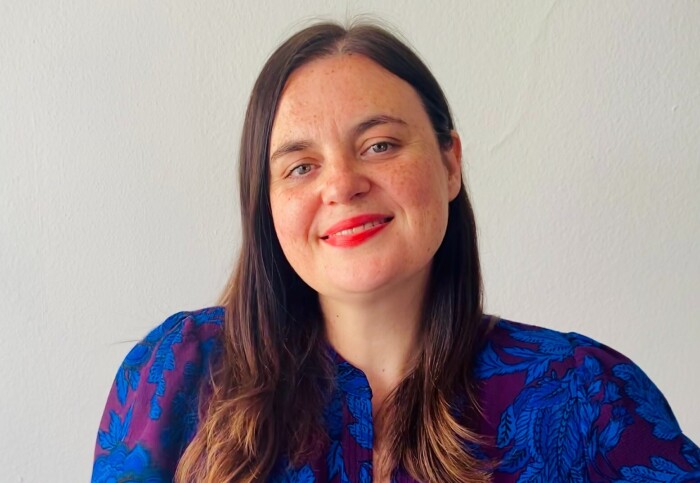Meet Imperial’s exciting women-led startups

Five groundbreaking startups founded by women students and alumni from Imperial have been selected as finalists for the WE Innovate programme.
From a pollution-extracting drainage system to programmable textiles, this year’s innovators are striving to improve our quality of life through smart improvements in healthcare and new technology to help protect the environment.
The WE Innovate programme, run by Imperial’s Enterprise Lab, is a targeted pre-accelerator designed to support the next generation of women-led startups and help them develop new businesses.
The five finalists, selected from a group of 25 teams who were shortlisted by the judging panel, will go head-to-head in the WE Innovate Grand Final later this month. In the final, the teams will showcase their ideas and compete to win a share of the £30,000 prize fund.
Supporting early-stage business ideas
WE Innovate is a five-month programme that runs from January to May, supporting students, graduates and alumni who identify as women through masterclasses, business coaching, 1-to-1 expert support and peer mentoring. The programme aims to help participants develop an early-stage business idea and improve their leadership and entrepreneurial skills.
- You can register for free to attend the WE Innovate Grand Final at Imperial on Thursday 22 June, where you can see the finalists pitch their ideas to an audience of investors, start-up founders and students. Tickets are available on a first-come-first-served basis – book here.
Commenting on this year’s competition, programme manager Camille Reltien, from Imperial’s Enterprise Lab, said: “WE Innovate champions the talents of women innovators and advocates for gender equality in business. Our goal is to make Imperial a great place for ambitious women to study, innovate, collaborate and pursue their ideas.
“This year’s finalists are a force to be reckoned with. We wish them the very best of luck with their pitches at the Grand Final, and every future success in navigating their chosen fields.”
This year’s startups are:
aiKNIT
aiKNIT is a programmable textile device that facilitates healing of musculoskeletal conditions and blurs the boundaries between a medical device and a fashion garment. The device is designed to help the 500 million people worldwide who suffer with arthritis conditions and wear pain relief devices that are uncomfortable, uniform in functionality and visually unappealing, the team say. aiKNIT's adaptive tailor-made glove provides support and compression, while allowing freedom of movement in non-affected areas.
aiKNIT is founded by Healthcare and Design graduate Sophie Richter.

Aloe Health
Aloe Health is a digital assessment tool and wellbeing resource which empowers parents to take control of their mental health. The tool takes mental health assessments used by clinicians and allows parents to self-assess at their convenience.
Its creators hope that it will help to reduce the stigma and secrecy associated with mental health issues. Under-detection of such issues can result in significant personal and societal costs, with research suggesting that increasing access to treatment for common maternal mental health problems could have a net benefit of half a billion pounds to the NHS over ten years.
Aloe Health is founded by Healthcare and Design graduate Saw Nwe and Harry Fitzpatrick.

Carbon Cell
Carbon Cell is a non-toxic, fully biodegradable material that hopes to make expanded polystyrene a thing of the past. Traditional petrochemical-based foams contain harmful chemicals and take hundreds of years to degrade.
In contrast, Carbon Cell is made from biochar, a porous fully biodegradable material that sequesters carbon and can be produced from waste stream products that would otherwise be burned or decomposed, such as potato peel and used textiles. This provides a sustainable, lightweight bio-foam suitable for many popular applications such as thermal packaging, industrial horticulture and building insulation.
Carbon Cell is founded by Innovation Design Engineering students Elizabeth Lee, Aron Ori Blich, Juan Ignacio Rion and Eden Harrison.

Guerrilla
Guerrilla is a roadside drainage system that captures pollution in cities by removing pollutants as soon as they are created and before they enter our water systems. It aims to tackle the issue of pollution from surface runoff from cities, which is a key cause of global ocean pollution. For example, surface water run-off in London can carry more than 300 different pollutants into waterways, according to a 2019 study from the Greater London Authority.
The Guerrilla system provides a modular, scalable and retrofittable solution for capturing surface pollutants from surface water runoff without using any energy or moving parts. It enables roadside drains to capture particulate pollution (such as microplastics, tyre particles, pathogens, toxic hydrocarbons and heavy metals) which would otherwise be washed untreated through our drainage network and into our rivers when it rains.
Guerrilla is co-founded by Innovation Design Engineering graduates Summer Chen, Henry Parkin, Hunaid Nagaria and Adhesh Shenoy.

Matrix
Matrix is a 21st century replacement for the speculum that is digitally enabled and designed for patient comfort and self-use in a clinical setting. The speculum is widely used in gynaecology for routine procedures such as cervical cancer screening and pelvic examinations. However, it is an invasive and uncomfortable instrument that has barely changed since Roman times.
The Matrix device preserves privacy by being self-administered and digitally responsive, transmitting health data electronically. As 30 per cent of eligible individuals do not attend their cervical smear appointments (with 42 per cent of such individuals citing embarrassment as a reason), this device could help to reduce preventable disease by improving patient attendance and deliver savings on the costs of missed NHS appointments.
Matrix is founded by Healthcare and Design graduate Stiliyana Minkovska.

--
To read more about the achievements of the 25 teams who have taken part in this year’s WE Innovate cohort, visit the 2023 Showcase Page featuring all our participants’ innovations.
Article text (excluding photos or graphics) © Imperial College London.
Photos and graphics subject to third party copyright used with permission or © Imperial College London.
Reporter
Conrad Duncan
Communications Division